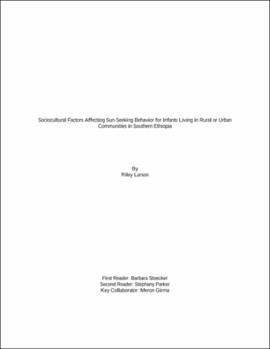| dc.contributor.author | Larson, Riley | |
| dc.date.accessioned | 2021-04-19T21:13:13Z | |
| dc.date.available | 2021-04-19T21:13:13Z | |
| dc.date.issued | 2015-04-06 | |
| dc.identifier | oksd_larson_HT_2015 | |
| dc.identifier.uri | https://hdl.handle.net/11244/329220 | |
| dc.description.abstract | Introduction: Ethiopians depend on sunlight for vitamin D synthesis due to limited dietary sources. This qualitative study investigated sociocultural factors affecting sun exposure for infants of women from three categories: initial pregnancies, mothers of infants 1-2 y, and grandmothers. | |
| dc.description.abstract | Methods: Eighteen focus groups with ~10 participants each were held in three urban and three rural communities. In-depth interviews were conducted with local health extension workers (HEWs). | |
| dc.description.abstract | Results: Reports from grandmothers indicated that awareness of benefits of sun exposure for infants has increased in the last generation. Practicing infant sun exposure is a generally accepted practice among all participants. Mothers wait to expose their infants to sunlight for 1-3 months in rural and ~15 days in urban areas. The prevalent feeling was that roughly 30 minutes of morning sunlight (7-9 am), never afternoon sun, was best for infant health. Barriers mentioned for mothers were headaches, skin irritation, catching a cold from drafts, and general discomfort. Barriers for infant exposure postpartum included fear of the evil eye and catching a cold from drafts. Only 2/82 rural and 26/88 urban women freely associated sunlight with vitamin D. HEWs provided health information for a self-reported 96% of rural and 88% of urban women. Most participants agreed that sun exposure was generally healthy for their infants with urban women citing more knowledge of its benefits for bone health than rural women. | |
| dc.description.abstract | Discussion: It appears that, besides heavy sunlight, mothers have few aversions to sunlight itself. Rather, they fear illness caused by public exposure (evil eye) and temperature changes (drafts causing colds). Delays in initiating sun exposure and short exposure duration in the mornings only may prevent adequate vitamin D synthesis in this population. Variable understanding of the specific importance of sun exposure amongst rural women and of sources of vitamin D in both groups indicates disparities in knowledge transfer and application. Our data support additional training of both rural and urban HEWs regarding benefits of sun exposure for infants in order to increase this behavior, promote its earlier initiation, and increase its duration in both rural and urban populations. | |
| dc.format | application/pdf | |
| dc.language | en_US | |
| dc.rights | Copyright is held by the author who has granted the Oklahoma State University Library the non-exclusive right to share this material in its institutional repository. Contact Digital Library Services at lib-dls@okstate.edu or 405-744-9161 for the permission policy on the use, reproduction or distribution of this material. | |
| dc.title | Sociocultural factors affecting sun-seeking behavior for infants living in rural or urban communities in southern Ethiopia | |
| osu.filename | oksd_larson_HT_2015.pdf | |
| dc.type.genre | Honors Thesis | |
| dc.type.material | Text | |
| dc.contributor.director | Stoecker, Barbara J. | |
| dc.contributor.facultyreader | Parker, Stephany | |
| thesis.degree.discipline | Nutritional Sciences | |
| thesis.degree.grantor | Oklahoma State University | |
